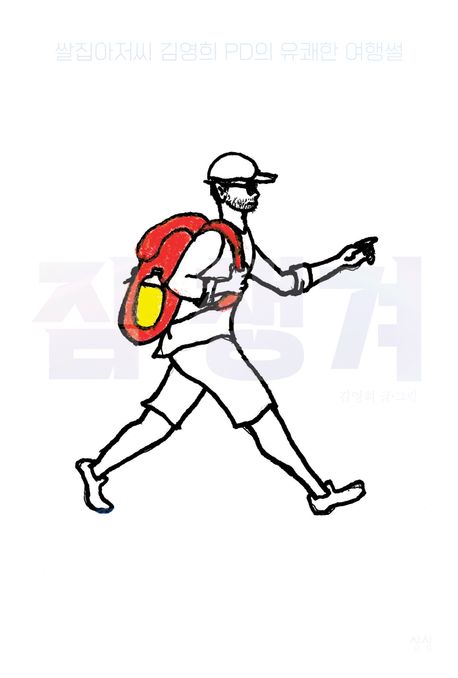"Packing Is Protecting Me"
I wake up in a city I don’t know.
"Pack Your Bag," a new essay collection by producer Kim Young-hee, was published in August 2025 and began circulating among readers almost immediately.
Drawing on instincts honed in television production, Kim packs those senses into a single backpack and captures small scenes, casual conversations, and moments that feel like a private broadcast from the road.
The book pairs short, sharp writing with the author’s own drawings, pulling the reader straight into each place.
Scenes arrive in spare sentences.
Kim Young-hee is the producer behind familiar Korean shows such as the long-running variety program "Sunday Sunday Night," the lifestyle series "Conscience Refrigerator," and the prank-based comedy of "Lee Kyung-gyu's Hidden Camera." (These are well-known shows in Korea that helped shape modern variety television there.)
His experience planning shows gives the essays a steady beat and an economy of timing. Meanwhile, the illustrations placed throughout warm the emotional tone and deepen immersion.

How a Small Backpack Sparks Big Change
Travel begins with small choices.
"Pack Your Bag" is not simply a travel diary. Rather, it records a process of stepping out of daily habits and finding oneself again.
In unfamiliar alleys, markets, and scenes seen from bus windows, the author notices the moments that let him read himself a new way.
Some readers will call travel rest; others will call it fuel for creative work. Both views make sense.
Kim observes people—what they say and how they move—with the same attention he once used to plan television segments.
That observational instinct lines his sentences with wit and tenderness.
Some passages read like brief comic panels; others leave a quiet echo that lingers.
Why This Essay Resonates Now
There is a clear cultural need at this moment.
In 2025, audiences swamped by fast information seem to hunger for pauses they can claim for themselves.
"Pack Your Bag" offers that pause in a concrete form: traveling, noticing, and returning with small adjustments to daily life.
Furthermore, a veteran TV planner’s eye helps make the essays accessible to a broad audience.
On the other hand, attention can be a mixed blessing.
Some critics argue that the author’s fame influences how the work is received.
They worry that the book sometimes rests on personal anecdote in a way that could limit universal empathy.
Still, many readers report finding comfort between the lines of humor and sincerity.
Two Voices: Praise and Critique
Supporters say the book offers tools for self-reflection.
Readers describe the essays as prompts for looking inward: travel as a deliberate method for creative recharge.
Kim’s history producing popular shows helps infuse sentences with a natural rhythm and playful timing, which makes the essays easy to read.
Supporters also value the pairing of drawings and text.
His sketches raise the emotional temperature of scenes and make memories more tangible.
Beyond titles like broadcaster or celebrity spouse, the author’s attempt to simply be himself resonates with many modern readers seeking authenticity.
Critics are equally clear.
Some reviewers find the essays short on depth.
They argue that constant levity can sometimes mask deeper questions about life.
There is also concern that the cultural contexts of the places he visits are sometimes treated lightly, which can feel superficial.
Behind those critiques lies another worry about commercialization.
Books by well-known media figures can blend fandom-driven marketing with literary ambition, and some fear popularity may be chosen over originality.
However, even many critics concede that Kim’s voice and experiences still offer genuine consolation to certain readers, which keeps the overall conversation balanced.
Which Weighs More: Depth or Popular Appeal?
The debate continues.
The purpose of a travel essay varies: for one reader it may be solace, for another it may be a tool for serious reflection.
Therefore, standards of depth depend on what each reader expects.
Those who prize literary complexity may find "Pack Your Bag" lighter than they prefer.
Conversely, readers whose routines leave little room for creative recharge may find the book’s friendly tone and practical approach far more useful.
Kim doesn’t prescribe grand philosophy. Instead, he proposes small, actionable shifts: one step, one bag, one change in perspective. Whether this becomes a lasting insight or a passing trend depends on the individual reader.
Conclusion and a Final Question
The core idea is balance.
"Pack Your Bag" leads with humor and honesty, pairing images and sentences to guide the reader.
Kim’s background in broadcast rhythm gives the essays momentum, and travel appears as an accessible source of creative stimulus.
Readers should remember that standards for depth will vary from person to person.
The book quietly argues for a posture of self-preservation: packing not as escape but as a way to protect and replenish oneself.
Small insights gathered on the road can redraw aspects of daily life in modest but meaningful ways.
In short, "Pack Your Bag" opens a door to both comfort and inspiration.
Now the book asks the reader: What will you pack next?
"Pack Your Bag" is a travel essay by producer Kim Young-hee, published in August 2025. It explores how leaving daily routines can prompt self-reflection and creative inspiration.
Kim’s background in popular television appears in lively sentences and timing, and his own illustrations enrich the reading experience.
Supporters cite practical consolation and creative stimulus; critics point to limited depth and occasional superficiality in cultural context.
Taken together, the book attempts a balance between broad appeal and personal introspection.